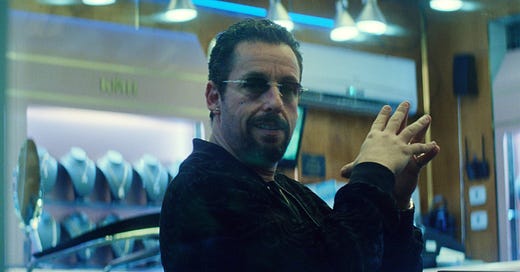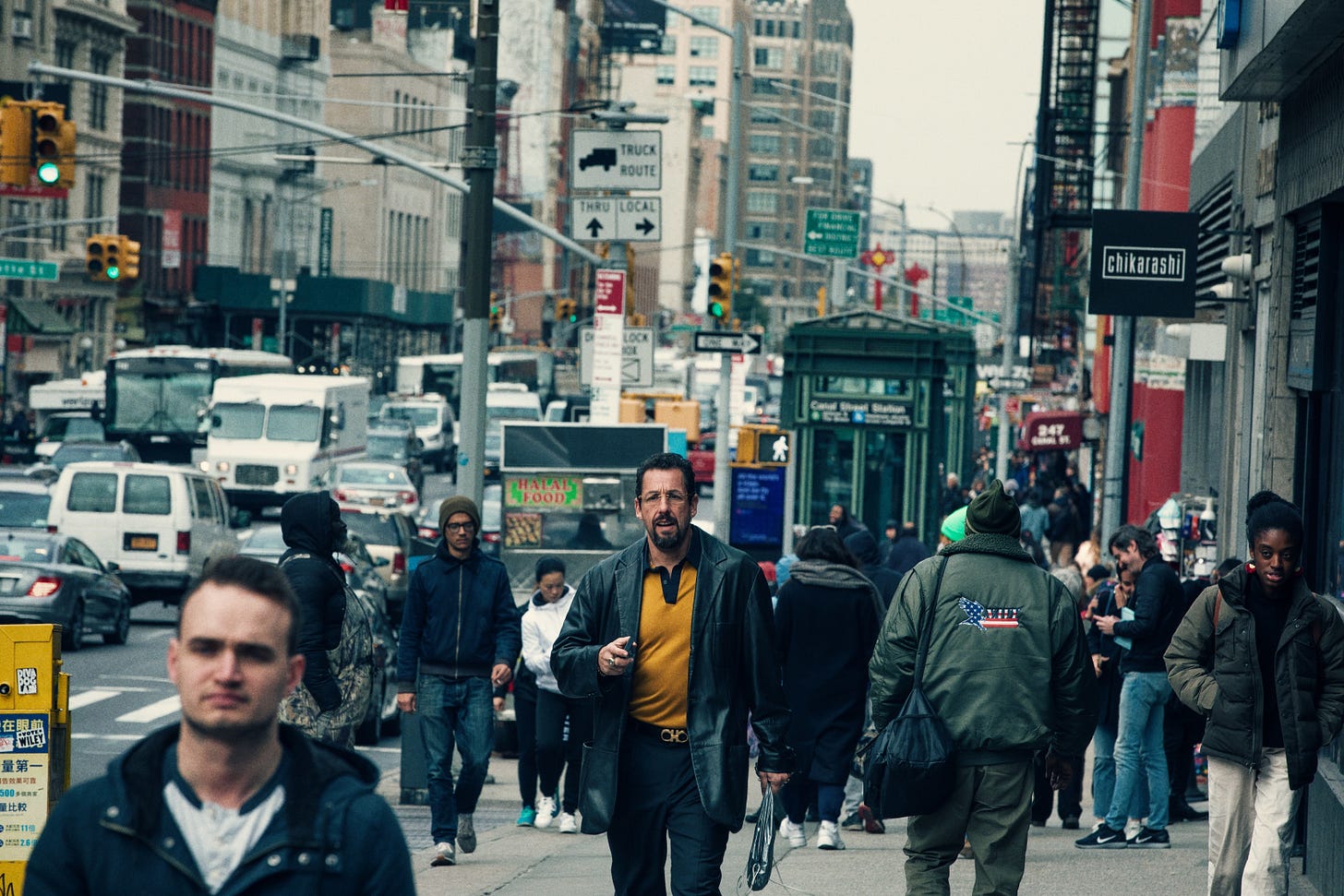Spoilers for Uncut Gems (2019)
Uncut Gems is, we can now assume, the Safdie Brothers’ final film as a duo and stands as a testament to their ability to build tension to almost unbearable levels across two hours. In possibly his best performance, certainly up there with Punch Drunk Love (Paul Thomas Anderson, 2002), Adam Sandler plays Howard Ratner – a New York jeweller and gambling addict who must try and reconcile a series of bad decisions in the space of a few days.
It is a film that rattles by at such a pace that it is hard to catch your breath. The Safdies have perfected a rapid-fire way of speech that cranks up the tension, even when the characters do not appear to be in immediate danger. Through just a few unpleasant encounters and the constant, almost shouted dialogue, we are quickly aware of how dire Howard’s circumstances are.
There is no way that the tension would not lead to an explosion of sorts, and it all comes to a head in the final few minutes. Howard has taken the money he owes his brother-in-law Arno (Eric Bogosian) and placed it on an elaborate bet for the Celtics to win their game. When Arno and his henchmen – Phil (Keith William Richards) and Nico (Tommy Kominik) – confront him, Howard refuses to call off the bet and instead traps them between the security doors of his jewellery store.
As Howard watches the game, it slowly becomes clear that he is going to win the bet, which is worth around $1.2 million – more than enough to pay off all his debts and start again with his girlfriend Julia (Julia Fox). Arno sees this and starts to rally behind Howard, not so much with words but with his increased interest in the game on television.
For the briefest moment, it looks like we will get a happy ending. The bet pays off and Howard celebrates but as he lets Arno and the goons out, Phil shoots him in the face. This comes as a shock to everyone and when Arno protests, Phil kills him as well before starting to ransack the store with Nico.
The ending is akin to blunt force trauma for the audience. A sudden crash landing to the euphoric high of seeing everything go right for Howard. It also highlights two of the key themes of the film – short-term thinking and pride. All the main players in the story suffer from these afflictions, and they are the downfall of everyone.
For Howard, his failure to see the long-term consequences of his actions lead to his death. There are several points in the film where he has – or could easily raise Arno’s money – and yet he is always looking for a quick gain, rather than pay off a debt and make his life easier. Yet the film is slightly less critical of Howard. Despite his gambling being an addiction, he is shown to have a skill for it. Earlier in the film, it is revealed that he would have won $600,000 had Arno not stopped the bet – here Arno’s pride stops him from receiving the money he is after.
About you. About how you're taking my money.
All of the time and placing bets.
You know what that does to me?
You know how offensive it is to me?
While he is in the right. Arno’s hurt pride over not being paid back leads to him stopping a bet that would have seen him receive all his money. When Howard manages to avoid the same thing happening later in the film, Arno quickly comes around. While his rightful frustration is still there, he can see that Howard’s gamble has paid off and that he will receive the money owed. Arno sees the long-term play and accepts it.
Phil is something different. Bubbling with rage, he is always the first to make the confrontations with Howard physical. As Arno’s muscle, he takes the slights that his boss has suffered personally. You can see several times in the film that he is urging Arno to take more extreme actions. The final straw for him is the embarrassment of being outwitted by Howard. He seethes when he is trapped between the security doors. As the camera moves to him, his eyes never leave Howard. From the moment those doors closed, he planned to take out his frustrations on Howard.
He is quite literally blinded by rage. Whereas Howard’s windfall would more than cover his debts, and see the henchmen paid quite handsomely as well, he instead chooses to kill Howard and ransack the store. Phil and Nico are left without the money, without a boss, and lumbered with bags full of jewellery that will only bring about a short-term financial gain. Probably not even that, as the film ends with the sounds of sirens.
It is a stark indication of how pride and the toxicity it creates can destroy everything around a person. Had Arno got his money, the matter would have been settled. Howard could have covered it and interest. Would Howard have continued to make poor decisions and run from one mistake to another? But he would have done it far away, without impinging on Arno and the wider family.
But Phil had been slighted. His boss had been messed around. The short-term satisfaction of taking revenge far outweighed the long-term benefits of letting things play out.
Directors: Josh Safdie, Benny Safdie
Writers: Ronald Bronstein, Josh Safdie, Benny Safdie
Starring: Adam Sandler, LaKeith Stanfield, Julia Fox, Kevin Garnett, Idina Menzel, Eric Bogosian










Well said.